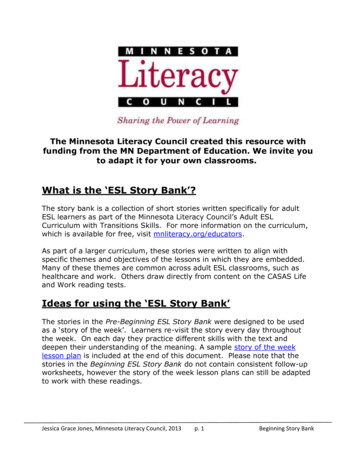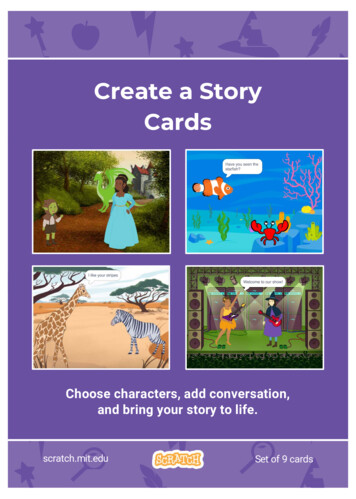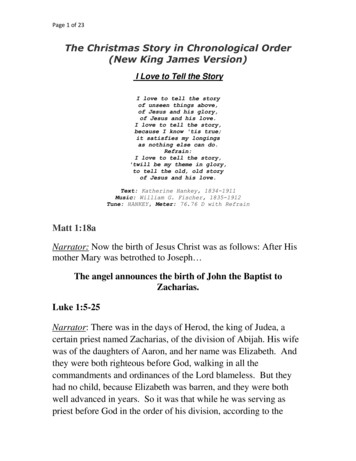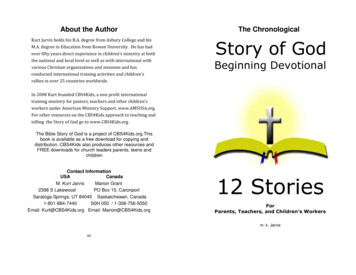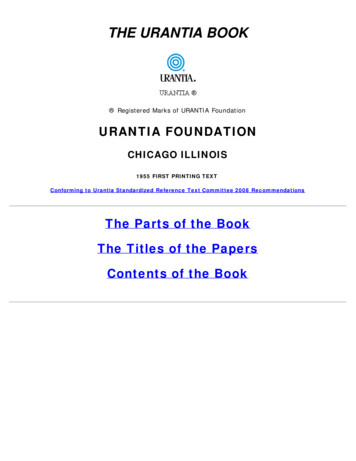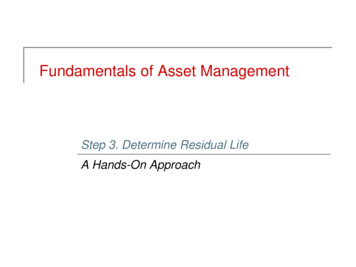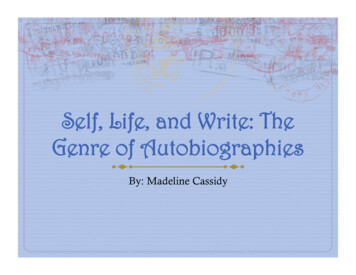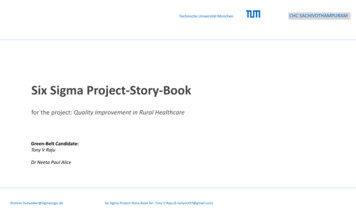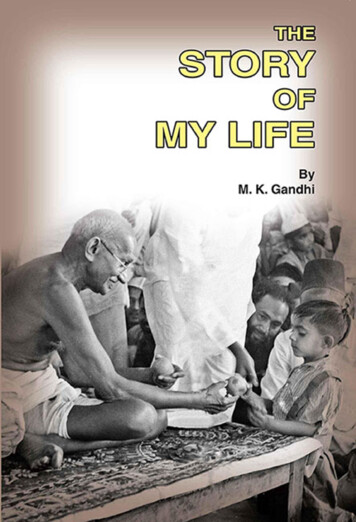
Transcription
Specially Prepared for Use in Indian SchoolsTHE STORY OF MY LIFEBYM. K. GANDHIAbridged and Simplified with Topics for EssaysbyBharatan KumarappaNAVAJIVAN PUBLISHING HOUSEAHMEDABAD-380 014
Navajivan Trust, 1955First Edition, July 1955This reprint, 15,000 Copies, December 2000Total : 2,26,000 CopiesThe price of this book issubsidised by Navajivan Trust.ISBN 81-7229-055-1Printed and Published byJitendra T. DesaiNavajivan Mudranalaya,Ahmedabad-380 014
INTRODUCTIONIt is not my purpose to attempt a real autobiography or story of mylife. I simply want to tell the story of my numerous experiments withtruth, and as my life consists of nothing but those experiments, the storywill take the shape of an autobiography. My experiments in the politicalfield are now known. But I should certainly like to narrate my experiments in the spiritual field which are known only to myself, and fromwhich I have derived such power as I possess for working in thepolitical field. The experiments I am about to relate are spiritual, orrather moral; for the essence of religion is morality.Only those matters of religion that can be understood as much bychildren as by older people, will be included in this story. If I cannarrate them in a dispassionate and humble spirit many other experiments will . obtain from them help in their onward march.M. K. GandhiThe Ashram, Sabarmati,26th November, 1925iii
EDITOR'S NOTEGandhiji's Autobiography* and his Satyagraha in South Africa , aspublished in English, run into almost 1000 pages. An abridgement ofthese two into a single volume of 283 pages was published in 1952 bythe Navajivan Trust. A request was recently received for a still smallerversion for use in our schools. This book has been specially prepared tomeet the need.Matters which are not likely to be of much interest to school childrenhave been omitted, and the language has been simplified where possible.Topics for essays and discussions have been suggested at the end ofmost of the chapters. They have been framed to suit both higher andlower classes. Teachers may select from them the questions which arewithin the capacity of their pupils to tackle. An interesting period maybe spent by the class discussing together one or other of the moredifficult topics, and then in another period the pupils may be asked towrite an essay on the topic.Bharatan KumarappaJuly, 1955* Published by Navajivan Publishing House, Ahmedabad-380 014, price Rs. 20,Popular Edn. Published by Navajivan Publishing House, Ahmedabad-380 014, price Rs. 15 i. e. Gandhiji's Autobiography [Abridged], price Rs. 10iv
PUBLISHER'S NOTEIn this reprint of the book, Grammar Exercises framed by Dr. C. N.Zutshi have been omitted as they had been framed according to syllabuses which have been greatly changed now-a-days. Topics for essaysand discussions have been placed chapterwise at the end of the book.This book was originally prepared for use in our schools. The publisher is happy to note that, owing to recent resurgence of interest inGandhiji, this book has been prescribed as one of the text-books forcertain general knowledge examinations by some voluntary educationalorganizations. Hence it is expected that this reprint will have a widerarea of utility than the one that was originally intended for it.May, 1984v
CONTENTSChapterINTRODUCTIONEDITOR'S NOTEPUBLISHER’S NOTEPageiiiivvPART I : CHILDHOOD AND YOUTHBIRTH AND PARENTAGEAT SCHOOLMARRIAGEA TRAGIC FRIENDSHIPSTEALINGMY FATHER’S ILLNESS AND DEATHGLIMPSES OF RELIGIONPREPARATION FOR ENGLANDON BOARD THE SHIP127811131415181011121314PART II : IN ENGLAND AS STUDENTIN LONDONPLAYING THE ENGLISH GENTLEMANCHANGESSHYNESS MY SHIELDACQUAINTANCE WITH RELIGIONS21222528281516PART III : IN INDIA AS BARRISTERBACK IN INDIATHE FIRST SHOCK3032123456789212223PART IV : IN SOUTH AFRICAARRIVAL IN SOUTH AFRICATO PRETORIAFIRST DAY IN PRETORIAGETTING ACQUAINTED WITHTHE INDIAN PROBLEMTHE CASEMAN PROPOSES, GOD DISPOSESTHE 3 TAX4345454624PART V : VISIT TO INDIAIN INDIA482526PART VI : BACK IN SOUTH AFRICASTORMY ARRIVAL IN SOUTH AFRICASIMPLE LIFE495317181920vi353642
272829A RECOLLECTION AND A PENANCETHE BOER WARCOSTLY GIFTS5556573031PART VII : BACK IN INDIAMY FIRST CONGRESSIN BOMBAY5860323334353637383940414243PART VIII : IN SOUTH AFRICA AGAININ SOUTH AFRICA AGAINSTUDY OF THE GITATHE MAGIC SPELL OF A BOOKTHE PHOENIX SETTLEMENTTHE ZULU REBELLIONKASTURBA’S COURAGEDOMESTIC SATYAGRAHATHE ADVENT OF SATYAGRAHAIMPRISONMENTASSAULTRESUMPTION OF SATYAGRAHATHE TRIUMPH OF SATYAGRAHA6061626363646666686871734445PART IX : IN INDIA AND FOUNDING OF THE ASHRAMIN POONAFOUNDING OF THE ASHRAM74774647PART X : CHAMP ARANTHE STAIN OF INDIGOTHE STAIN REMOVED788048PART XI : AHMEDABAD LABOURIN TOUCH WITH LABOUR814950PART XII : THE KHEDA SATYAGRAHATHE KHEDA SATYAGRAHANEAR DEATH’S DOOR828451PART XIII : THE ROWLATT ACT AND ENTRANCE INTO POLITICSTHE ROWLATT ACT865253PART XIV : THE BIRTH OF KHADITHE BIRTH OF KHADIFAREWELLTOPICS FOR ESSAYSvii899092
A“I have nothing new to teach the World.Truth and non-violence are as old as hills.”M. K. Gandhiviii
PART I : CHILDHOOD AND YOUTH1. BIRTH AND PARENTAGEMy father, Karamchand Gandhi,was Prime Minister in Porbandar.He was a lover of his clan, truthful, brave and generous, but shorttempered.He never had any ambition toaccumulate riches and left us verylittle property.He had no education. At best, hemight be said to have read up tothe fifth Gujarati standard. Of history and geography he was innocent. But his rich experience ofpractical affairs stood him in goodstead in the solution of the mostintricate questions and in managinghundreds of men. Of religioustraining he had very little, but hehad that kind of religious culturewhich frequent visits to templesand listening to religious discourses make available to manyHindus.The outstanding impression mymother has left on my memory isthat of saintliness. She was deeplyreligious. She would not think oftaking her meals without her dailyprayers. Going to Haveli – theVaishnava temple – was one of herdaily duties. As far as my memorycan go back, I do not rememberher having ever missed theChaturmas. She would take thehardest vows and keep them whatever happened. Illness was no excuse for relaxing them. I can recallher once falling ill when she wasThe house at Porbandar1
observing the Chandrayana vow,but the illness was not allowed tocome in the way of the observance. To keep two or three fastsone after another was nothing toher. Living on one meal a day during Chaturmas was a habit withher. Not content with that shefasted every other day during oneChaturmas.DuringanotherChaturmas she vowed not to havefood without seeing the sun. Wechildren on those days wouldstand, staring at the sky, waiting toannounce the appearance of thesun to our mother. Everyoneknows that at the height of therainy season the sun often does notshow his face. And I rememberdays when, at his sudden appearance, we would rush and announceit to her. She would run out to seewith her own eyes, but by thattime the sun would be gone, thusdepriving her of her meal. “Thatdoes not matter,” she would saycheerfully, “God did not want meto eat today.” And then she wouldreturn to her round of duties.My mother had strong commonsense. She was well informedabout all matters of State.Of these parents I was born atPorbandar, otherwise known asSudamapuri, on the 2nd October1869.2. AT SCHOOLI passed my childhood inPorbandar. I remember havingbeen put to school. It was withsome difficulty that I got throughthe multiplication tables. I recollectnothing more of those days thanhaving learnt, in company withother boys, to call our teacher allkinds of names.I must have been about sevenwhen my father left Porbandar forRajkot. There I was put into a primary school, and I can well remember those days. As atPorbandar, so here, there is hardlyanything to note about my studies.2From this school I went to the suburban school and thence to thehigh school, having alreadyreached my twelfth year. I do notremember having ever told a lie,during this short period, either tomy teachers or to my schoolmates.I used to be very shy and avoidedall company. My books and mylessons were my sole companions.To be at school at the stroke of thehour and to run back home as soonas the school closed, – that wasmy daily habit. I literally ran back,because I could not bear to talk toanybody. I was even afraid lest
anyone should poke fun at me.There is an incident which occurred at the examination duringmy first year at the high schooland which is worth recording. Mr.Giles, the Educational Inspector,had come on a visit of inspection.He had set us five words to writeas a spelling exercise. One of thewords was ‘kettle’. I had misspeltit. The teacher tried to prompt mewith the point of his boot, but Iwould not be prompted. It was beyond me to see that he wanted meto copy the spelling from myneighbour’s slate, for I had thoughtthat the teacher was there to supervise us against copying. The resultwas that all the boys, except myself, were found to have spelt every word correctly. Only I hadbeen stupid. The teacher tried laterto tell me that I should not havebeen so stupid, but without effect.I never could learn the art of‘copying’.Yet the incident did not in theleast lessen my respect for myteacher. I was, by nature, blind tothe faults of elders. Later I came toknow of many other failings ofthis teacher, but my regard for himremained the same. For I had learntto carry out the orders of elders, notto look critically at their actions.Two other incidents belonging tothe same period have always clungto my memory. As a rule I did notlike any reading beyond my schoolbooks. The daily lessons had to bedone, because I did not want to betaken to task by my teacher, nor todeceive him. Therefore, I would dothe lessons, but often without mymind in them. Thus when even thelessons could not be done properly,there was of course no question ofany extra reading. But somehowmy eyes fell on a book purchasedby my father. It was Shravana*Pitribhakti Nataka (a play aboutShravana’s devotion to his parents). I read it with intense interest. There came to our place aboutthe same time wandering showmen. One of the pictures I wasshown was of Shravana carrying,by means of slings fitted for hisshoulders, his blind parents on apilgrimage. The book and thepicture left a permanent impression on my mind. “Here is anexample for you to copy,” I saidto myself.Just about this time, I had secured my father’s permission tosee a play performed by a certaindramatic company. This play –* Shravana, a young ascetic, was extremely devoted to his blind parents whom hecarried in a hammock for a pilgrimage. On his way he was accidentally shot dead byRama's father, King Dasharatha.3
Harishchandra – captured myheart. I could never be tired of seeing it. But how often should I bepermitted to go? I kept thinkingabout it all the time and I musthave acted Harishchandra to myself times without number. “Whyshould not all be truthful likeHarishchandra ?” was the questionI asked myself day and night. Tofollow truth and to go through allthe ordeals Harishchandra wentthrough was the one ideal it inspired in me. I literally believed inthe story of Harishchandra. Thethought of it all often made meweep.I was not regarded as a dunce atthe high school. I always enjoyedthe affection of my teachers. Certificates of progress and characterused to be sent to the parents every year. I never had a bad certificate. In fact I even won prizes after I passed out of the second standard. In the fifth and sixth I obtained scholarships of rupees fourand ten respectively, an achievement for which I have to thankgood luck more than my merit. Forthe scholarships were not open toall, but reserved for the best boysamongst those coming from theSorath Division of Kathiawad. Andin those days there could not havebeen many boys from Sorath in aclass of forty to fifty.My own recollection is that Ihad not any high regard for myability. I used to be astonishedwhenever I won prizes and scholarships. But I very jealouslyguarded my character. The leastlittle fault drew tears from myeyes. When I merited, or seemedto the teacher to merit, a rebuke, itwas unbearable for me. I remember having once received a beating.I did not so much mind the punishment, as the fact that it wasconsidered my deserts. I wept piteously. That was when I was in thefirst or second standard. There wasanother such incident during thetime when I was in the seventhstandard. Dorabji Edulji Gimi wasthe headmaster then. He was popular among boys, as he was a disciplinarian, a man of method and agood teacher. He had made gymnastics and cricket compulsory forboys of the upper standards. I disliked both. I never took part in anyexercise, cricket or football, before Harishchandra, according to Hindu epics, was a king. He was famous for hisliberality, and unflinching adherence to truth. The celebrated sage Vishwamitra decidedto test the king and subjected him to very severe tests including compulsion to put hisown wife to death as a witch ! The king, however, stood the test with great courage andtruthfulness.4
they were made compulsory. Myshyness was one of the reasons forthis aloofness, which I now seewas wrong. I then had the falsenotion that gymnastics had nothingto do with education.I may mention, however, that Iwas none the worse for keepingaway from exercise. That was because I had read in books aboutthe benefits of long walks in theopen air, and having liked the advice, I had formed a habit of taking walks, which has still remainedwith me. These walks gave me afairly hardy constitution.The reason of my dislike forgymnastics was my keen desire toserve as nurse to my father. Assoon as the school closed, I wouldhurry home and begin serving him.Compulsory exercise came directlyin the way of this service. I requested Mr. Gimi to exempt mefrom gymnastics so that I might befree to serve my father. But hewould not listen to me. Now it sohappened that one Saturday, whenwe had school in the morning, Ihad to go from home to the schoolfor gymnastics at 4 o'clock in theafternoon. I had no watch, and theclouds deceived me. Before Ireached the school the boys had allleft. The next day Mr. Gimi, examining the roll, found me markedabsent. Being asked the reason forabsence, I told him what had happened. He refused to believe meand ordered me to pay a fine ofone or two annas (I cannot nowrecall how much).I was convicted of lying ! Thatdeeply pained me. How was I toprove my innocence ? There wasno way. I cried in deep anguish. Isaw that a man of truth must alsobe a man of care. This was thefirst and last instance of my carelessness in school. I have a faintrecollection that I finally succeededin getting the fine refunded. Theexemption from exercise was ofcourse obtained, as my fatherwrote himself to the headmastersaying that he wanted me at homeafter school.But though I was none theworse for having neglected exercise, I am still paying the penaltyof another neglect. I do not knowwhence I got the notion that goodhandwriting was not a necessarypart of education, but I retained ituntil I went to England. Bad handwriting should be regarded as asign of an imperfect education. Itried later to improve mine, but itwas too late. I could never repairthe neglect of my youth.Two more incidents of myschool days are worth recording. Ihad lost one year because of mymarriage, and the teacher wanted5
me to make good the loss by skipping the class – a privilege usuallyallowed to hard-working boys. Itherefore had only six months inthe third standard and was promoted to the fourth after the examinations which are followed bythe summer vacation. Most subjects were taught in English fromthe fourth standard. I found it veryhard. Geometry was a new subjectin which I was not particularlystrong, and the English mediummade it still more difficult for me.The teacher taught the subject verywell but I could not follow him.Often I would lose heart and thinkof going back to the third standard,feeling that the packing of twoyears’ studies into a single yearwas too much. But this would discredit not only me, but also theteacher; because, counting on myability, he had recommended mypromotion. So the fear of thedouble discredit kept me at mypost. When, however, with mucheffort I reached the thirteenthproposition of Euclid, the uttersimplicity of the subject becameclear to me. A subject which onlyrequired a pure and simple use ofone’s reasoning powers could notbe difficult. Ever since that timegeometry has been both easy andinteresting for me.Sanskrit, however, proved a6harder task. In geometry there wasnothing to memorize, whereas inSanskrit, I thought, everything hadto be learnt by heart. This subjectalso began from the fourth standard. As soon as I entered thesixth I became disheartened. Theteacher was a hard task-master,anxious, as I thought, to force theboys. There was a sort of rivalrygoing on between the Sanskrit andthe Persian teachers. The Persianteacher was lenient. The boys usedto talk among themselves that Persian was very easy and the Persianteacher very good and considerateto the students. The ‘easiness’tempted me and one day I sat inthe Persian class. the Sanskritteacher was grieved. He called meto his side and said : “How canyou forget that you are the son of aVaishnava father ? Won't you learnthe language of your own religion ? If you have any difficulty,why not come to me ? I want toteach you students Sanskrit to thebest of my ability. As you proceedfurther, you will find in it things ofgreat interest. You should not loseheart. Come and sit again in theSanskrit class.”This kindness put me to shame.I could not disregard my teacher’saffection. If I had not acquired thelittle Sanskrit that I learnt then, Ishould have found it difficult to
take any interest in our sacredbooks. In fact I am sorry now thatI was not able to acquire a morethorough knowledge of the lan-guage, because I have since realized that every Hindu boy and girlshould possess sound Sanskritlearning.3. MARRIAGEIt is my painful duty to have torecord here my marriage at the ageof thirteen. As I see the youngstersof the same age about me who areunder my care, and think of myown marriage, I am inclined topity myself and to congratulatethem on having escaped my lot. Ican see no moral argument in support of such early marriage.I do not think it meant to meanything more than good clothes towear, drum beating, marriage processions, rich dinners and a strangegirl to play with. We gradually began to know each other, and tospeak freely together. We were thesame age. But I took no time inassuming the authority of a husband.I would not allow my wife to goanywhere without my permission.And Kasturba was not the girl toput up with any such thing. Shemade it a point to go out wheneverand wherever she liked. More restraint on my part resulted in moreliberty being taken by her and inmy getting more and more angry.Refusal to speak to one anotherthus became the order of the daywith us, married children. I think itwas quite innocent of Kasturba notto have bothered about my restrictions. How could an innocent girlput up with any restraint on goingto the temple or on going on visitsto friends? If I had the right torestrict her, had not she also asimilar right? All this is clear tome today. But at that time I had tomake good my authority as a husband !Let not the reader think, however, that ours was a life of constant quarrels. For my severitieswere all based on love. I wanted tomake my wife an ideal wife. Myambition was to make her live apure life, learn what I learnt, andidentify her life and thought withmine.I do not think Kasturba had anysuch desire. She did not know toread or write. By nature she wassimple, independent, perseveringand, with me at least, shy. She wasnot impatient of her ignorance andI do not recollect my studies having ever made her want to go infor studies herself.7
4. A TRAGIC FRIENDSHIPAmongst my few friends at thehigh school I had, at differenttimes, two who might be called intimate. One of these friendshipsdid not last long, though I nevergave up my friend. He gave meup, because I made friends withthe other. This latter friendship Iregard as a tragedy in my life. Itlasted long. I formed it in the spiritof a reformer.This companion was originallymy elder brother’s friend. Theywere classmates. I knew his weaknesses, but I regarded him as afaithful friend. My mother, my eldest brother, and my wife warnedme that I was in bad company. IWith a friend8was too proud to heed my wife’swarning. But I dared not goagainst the opinion of my motherand my eldest brother. Nevertheless I pleaded with them saying, “Iknow he has the weakness you attribute to him but you do not knowhis virtues. He cannot lead meastray, as my association with himis meant to reform him. For I amsure that if he reforms his ways, hewill be a splendid man. I beg younot to be anxious on my account.”I do not think this satisfiedthem, but they accepted my explanation and let me go my way.A wave of ‘reform’ was sweeping over Rajkot at the time when Ifirst came across this friend. Heinformed me that many of ourteachers were secretly taking meatand wine. He also named manywell-known people of Rajkot asbelonging to the same company.There were also, I was told, somehighschool boys among them.I was surprised and pained. Iasked my friend the reason and heexplained it thus: “We are a weakpeople because we do not eatmeat. The English are able to ruleover us, because they are meat-eaters. You know how hardy I am,and how great a runner too. It isbecause I am a meat-eater. Meat-
eaters do not have boils, and evenif they sometimes happen to haveany, these heal quickly. Our teachers and other distinguished peoplewho eat meat are no fools. Theyknow its virtues. You should dolikewise. There is nothing like trying. Try, and see what strength itgives.”All these pleas on behalf ofmeat-eating were not made at asingle sitting. They represent thesubstance of a long and elaborateargument which my friend was trying to impress upon me from timeto time. My elder brother had already fallen. He therefore supported my friend’s argument. I certainly looked feeble-bodied by theside of my brother and this friend.They were both hardier, physicallystronger, and more daring. Thisfriend’s exploits cast a spell overme. He could run long distancesand extraordinarily fast. He was anadept in high and long jumping.He could put up with any amountof physical punishment. He wouldoften display his exploits to meand, as one is always dazzledwhen he sees in others the qualities that he lacks himself, I wasdazzled by this friend’s exploits.This was followed by a strong desire to be like him. I could hardlyjump or run. Why should not Ialso be as strong as he ?Moreover, I was a coward. Iused to be afraid of thieves, ghostsand serpents. I did not dare to stirout of doors at night. Darknesswas a terror to me. It was almostimpossible for me to sleep in thedark, as I would imagine ghostscoming from one direction, thievesfrom another and serpents from athird. I could not therefore bear tosleep without a light in the room.My friend knew all these weaknesses of mine. He would tell methat he could hold in his hand liveserpents, could defy thieves anddid not believe in ghosts.All these had its due effect onme. I was beaten. It began to growon me that meat-eating was good,that it would make me strong anddaring, and that, if the whole country took to meat-eating, the Englishcould be overcome.A day was thereupon fixed forbeginning the experiment. It had tobe done in secret as my parentswere orthodox Vaishnavas, and Iwas extremely devoted to them. Icannot say that I did not knowthen that I should have to deceivemy parents if I began eating meat.But my mind was bent on the ‘reform’. It was not a question ofhaving something tasty to eat. I didnot know that it had a particularlygood taste. I wished to be strongand daring and wanted my coun9
trymen also to be such. The zealfor the ‘reform’ blinded me. Andhaving ensured secrecy, I persuaded myself that mere hiding thedeed from parents was no departure from truth.So the day came. We went insearch of a lonely spot by theriver, and there I saw, for the firsttime in my life, meat. There wasbaker's bread also. I did not likeeither. The goat's meat was astough as leather. I simply could noteat it. I was sick and had to leaveoff eating.I had a very bad night afterwards. A horrible dream hauntedme. Every time I dropped off tosleep it would seem as though alive goat were crying inside me,and I would jump up sorry forwhat I had done. But then I wouldremind myself that meat-eatingwas a duty and so become morecheerful.My friend was not a man togive in easily. He now began tocook various delicacies with meat.And for dining, no longer was thequiet spot on the river chosen, buta State house, with its dining halland tables and chairs, about whichmy friend had made arrangementswith the chief cook there.Gradually I got over my dislikefor bread, gave up my pity for thegoats, and began to enjoy meat10dishes, if not meat itself. Thiswent on for about a year. But notmore than half a dozen meat-feastswere enjoyed in all. I had nomoney to pay for this ‘reform’. Myfriend had therefore always to findthe money. I had no knowledgewhere he found it. But find it hedid, because he was bent on turning me into a meat-eater. But evenhis means must have been limited,and hence these feasts had necessarily to be few and far between.Whenever I had occasion to indulge in these secret feasts, eatingat home was impossible. Mymother would naturally ask me tocome and take my food and wantto know the reason why I did notwish to eat. I would say to her, “Ihave no appetite today; there issomething wrong with my digestion.” I knew I was lying, and lying to my mother. I also knew that,if my mother and father came toknow of my having become ameat-eater, they would be deeplyshocked. This knowledge wasmaking me feel uneasy.Therefore I said to myself :“Though it is essential to eat meat,and also essential to take up food‘reform’ in the country, yet deceiving and lying to one’s father andmother is worse than not eatingmeat. In their lifetime, therefore,meat-eating must be given up.
When they are no more and I haveThis decision I told to myfound my freedom, I will eat meat friend, and I have never since goneopenly, but until that moment ar- back to meat.rives I will keep away from it.”5. STEALINGI have still to relate some of myfailings during this meat-eating period and also previous to it, whichdate from before my marriage orsoon after.A relative and I became fond ofsmoking. Not that we saw anygood in smoking, or liked thesmell of a cigarette. We simplyimagined a sort of pleasure insending out clouds of smoke fromour mouths. My uncle had thehabit, and we should copy his example. But we had no money. Sowe began stealing stumps of cigarettes thrown away by my uncle.The stumps, however, were notalways available, and could notgive out much smoke either. So webegan to steal coppers from theservant’s pocket-money in order topurchase Indian cigarettes. But thequestion was where to keep them.We could not of course smoke inthe presence of elders. We managed somehow for a few weeks onthese stolen coppers. In the meantime we heard that the stalks of acertain plant could be smoked likecigarettes. We got them and beganthis kind of smoking.But we were far from being satisfied with such things as these.Our want of independence beganto be painful. It was unbearablethat we should be unable to doanything without the elders’ permission. At last, in sheer disgust,we decided to commit suicide !But how were we to do it? Fromwhere were we to get the poison?We heard that dhatura seeds werean effective poison. Off we went tothe jungle in search of these seedsand got them. Evening was thoughtto be the auspicious hour. We wentto Kedarji Mandir, put ghee in thetemple-lamp, had the darshan andthen looked for a lonely corner. Butour courage failed us. Supposing wewere not at once killed ? And whatwas the good of killing ourselves ?Why not rather put up with the lackof independence ? But we swallowed two or three seeds nevertheless. We dared not take more. Bothof us did not like to die, and decidedto go to Ramji Mandir to calm ourselves, and to dismiss the thought ofsuicide.11
I realized that it was not easy tocommit suicide.The thought of suicide ultimately resulted in both of us bidding goodbye to the habit of smoking and of stealing the servant’scoppers for the purpose.Ever since I have grown up, Ihave never desired to smoke andhave always regarded the habit ofsmoking as barbarous, dirty andharmful. I have never understoodwhy there is such a desire forsmoking throughout the world. Icannot bear to travel in a compartment full of people smoking. I become choked.But much more serious than thistheft was the one I was guilty of alittle later. I stole the coppers whenI was twelve or thirteen, possiblyless. The other theft was committed when I was fifteen. In this caseI stole a bit of gold out of mymeat-eating brother’s armlet. Thisbrother had run into a debt ofabout twenty-five rupees. He hadon his arm an armlet of solid gold.It was not difficult to clip a bit outof it.Well, it was done, and the debtcleared. But this became more thanI could bear. I resolved never tosteal again. I also made up mymind to confess it to my father.But I did not dare to speak. Notthat I was afraid of my father beat12ing me. No. I do not recall his everhaving beaten any of us. I wasafraid of the pain that I shouldcause him. But I felt that the riskshould be taken; that there couldnot be cleansing without a cleanconfession.I decided at last to write out theconfession to submit it to my father, and ask his forgiveness. Iwrote it on a slip of paper andhanded it to him myself. In thisnote not onl
life. I simply want to tell the story of my numerous experiments with truth, and as my life consists of nothing but those experiments, the story will take the shape of an autobiography. My experiments in the political field are now known. But I sho

